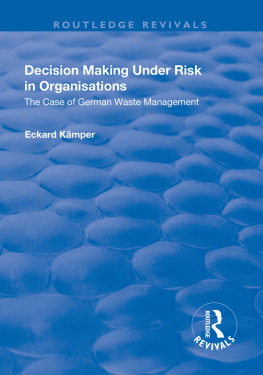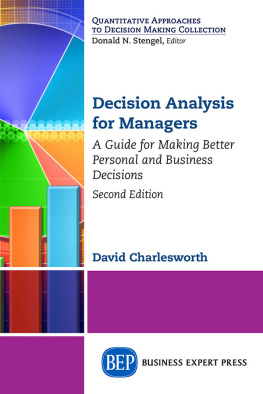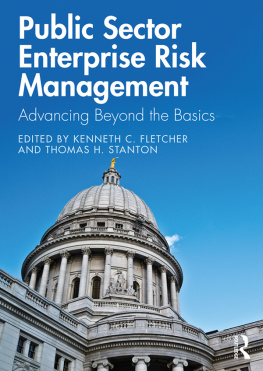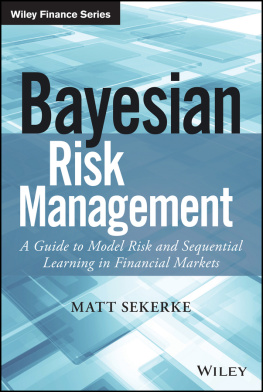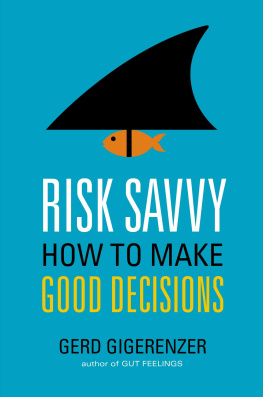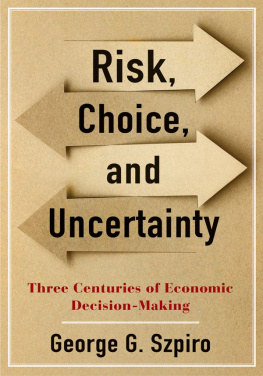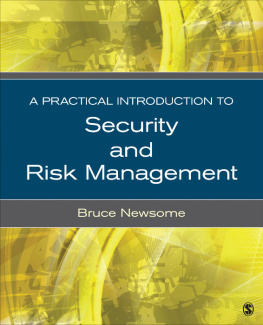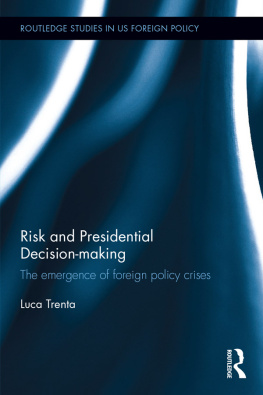DECISION MAKING UNDER RISK IN ORGANISATIONS
Decision Making Under Risk in Organisations
The Case of German Waste Management
Eckard Kmper
ISO Institute, Cologne
First published 2000 by Ashgate Publishing
Reissued 2018 by Routledge
2 Park Square, Milton Park, Abingdon, Oxon OX14 4RN
711 Third Avenue, New York, NY 10017, USA
Routledge is an imprint of the Taylor & Francis Group, an informa business
Copyright Eckard Kmper 2000
All rights reserved. No part of this book may be reprinted or reproduced or utilised in any form or by any electronic, mechanical, or other means, now known or hereafter invented, including photocopying and recording, or in any informativon storage or retrieval system, without permission in writing from the publishers.
Notice:
Product or corporate names may be trademarks or registered trademarks, and are used only for identification and explanation without intent to infringe.
Publishers Note
The publisher has gone to great lengths to ensure the quality of this reprint but points out that some imperfections in the original copies may be apparent.
Disclaimer
The publisher has made every effort to trace copyright holders and welcomes correspondence from those they have been unable to contact.
A Library of Congress record exists under LC control number: 00109127
ISBN 13: 978-1-138-73960-4 (hbk)
ISBN 13: 978-1-315-18408-1 (ebk)
This study analyses how organisations make decisions in situations characterised by risk. The empirical field to be studied is that of local waste management in Germany. The case of waste management has been chosen because, as will be argued in the following chapters, the management of household waste confronts administrative organisations with high amounts of risk and uncertainty. A typical feature of risk situations is that the organisation cannot avoid the problem by simply making no decision. To do this would be a decision in itself and would therefore also entail the taking if risks.
How do organisations behave in such a situation? The answer to this question will be given by a sociological analysis of decision making processes in two organisations. The study will be organised as follows: presents a summary and the conclusions of the study.
Many persons and institutions have made invaluable contributions to my work during the past few years. Special thanks go to the following persons: Prof Adrienne Hritier and Prof Wolfgang Krohn who gave me the opportunity to do the research for this study and provided me with support and encouragement; Markus Timmermeister for his co-operation and making important data available; Volker Vorwerk and Ralf Herbold for inspiring collaboration in Bielefeld; Petra Hiller and Veronika Tacke for helpful discussions of the theoretical framework; Prof Helmut Willke for indispensable support in the final phase of the work; David Geary for his careful correction of a former version of the text. The necessary infrastructure and financial support was provided by the following institutions: The European University Institute (Florence), the Institute for Science and Technology Studies (Bielefeld), the Centre for Technology Assessment (Stuttgart), the German Council of Environmental Advisors (Wiesbaden) and the Volkswagen Foundation.
The present study tries to analyse organisational processes of decision making under conditions of risk. The challenge for a sociological analysis of decision making under risk is, however, that the long tradition of theorising about problems of risk in decision making has taken place under the auspices of economic concepts of decision, risk, and uncertainty. Only in recent years, social theorists have put emphasis on developing genuinely sociological concepts of decision making, and of risk. These theoretical developments suggest that the classic conceptions of risk, rooted in economic theory, were not appropriate to guide empirical analyses of the social conflicts concerning risk (cf. e.g. Douglas 1985; Perrow 1984; Wynne 1987; Short 1984; 1989). Thus, for sociological analyses, it is necessary to develop concepts that deviate in almost all relevant aspects from the economic tradition.
In the following chapter, I will try to highlight the main characteristics of a sociological account of decision making under risk. This is necessary in order to clarify the deviations from the economic concepts. The economic tradition describes decision making as an action performed by individual or corporate actors who, on the basis of given preferences choose a course of action out of a given range of alternatives. In a sociological concept, decision making is an activity generated by behavioural expectations. The main consequence of this concept is that preferences lose their central theoretical position in explaining decision making processes. More important for the analysis of decision making are the expectations the decision reacts to.
The development toward this sociological approach will be sketched in the following sections (1.1, 1.2, 1.3). This general framework will then be applied to problems of decision making under risk (1.4).
1.1 Risk: The Initial Formulation
The initial formulation of a concept of risk was made by Frank Knight (1921). The context for the concept is provided by the framework of neoclassical economics. Within this framework, a decision situation can be characterised as follows: An actor is facing a situation with a range of decision alternatives. The actor is equipped with preferences, that are stable, exogenous, and transitive. Furthermore, the actor is characterised by maximising behaviour, i.e. he seeks to choose the alternative that serves his preferences best. The actor then makes his decision by evaluating the possible future consequences connected with the available alternatives. With the help of his preferences, the actor chooses the alternative that leads to the best consequences in terms of the actor's preferences. The interesting question for research on decision making processes is then the degree of rationality the decision maker achieves with his choice. Rationality is defined as the degree to which the decision maker manages to choose the alternative that serves his preferences best (Elster 1989; Luhmann 1988: 276).
Within this general framework, Knight places his concept of risk (1921: 197ff.). Risk is then to be distinguished from uncertainty. The actor finds himself in a situation of uncertainty if he cannot know whether the available alternatives really lead to the consequences he expects. This uncertainty is not measurable, because the actor does not know which factors influence the decision outcome. Risk, on the contrary, refers to measurable uncertainty. The actors thus know all of the possible decision outcomes, and the remaining problem is the calculation of the probability of their occurrence (cf. Bon 1995: 98pp.). For Knight, only situations of risk can be subject to scientific analysis. The problem is how to turn uncertainties into risk which in turn is considered to be an information problem.
This basic concept of decision making under risk has been highly influential. It has mainly guided economic research (e.g. Arrow 1970; Anand 1993; Dickinson et al. 1994; Hey 1997). Since the sixties, when social conflicts about the risks of large technical systems arose, the concept has also been the basis for the theories of scientific risk assessment. In these theories, risk is defined as the product of the magnitude of a possible harm times the probability of its occurrence. The result is a quantifiable, one-dimensional, and probabilistic measure of risk that allows the comparison of different risks such as the use of nuclear energy, smoking, car driving, etc. This approach has proven to be extremely useful in improving the safety of complex technologies (cf. Bechmann 1993; Renn 1992).

